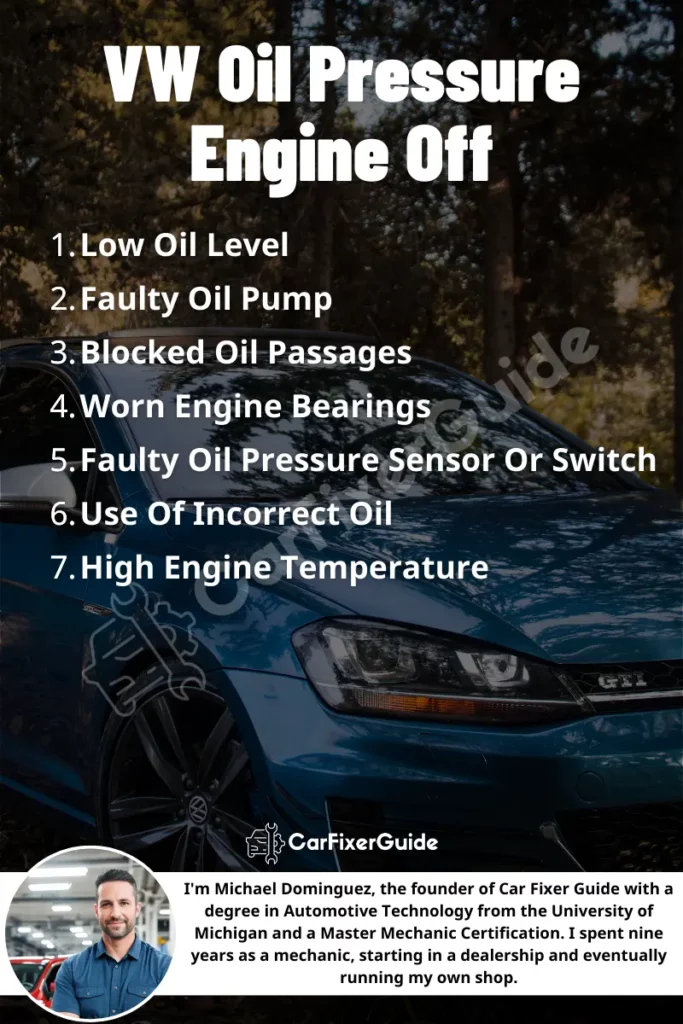Facing a blinking warning on your dashboard that reads “VW Oil Pressure Engine Off” can be as unsettling as hearing an unfamiliar noise in the dead of night.
It’s the kind of message that Volkswagen owners dread, signaling potential harm to your vehicle’s heart – its engine. This alarming alert isn’t just a simple notification; it’s a red flag indicating that immediate attention is required to prevent further, possibly irreparable damage.
In this exploration, we’ll dissect the criticality of maintaining optimal oil pressure in your VW, underscoring how such vigilance safeguards the engine’s longevity and performance.
By journeying through this article, you’ll learn essential diagnostics for identifying underlying issues causing low oil pressure warnings and practical steps towards resolution, ensuring your beloved Volkswagen remains not just operational but optimally efficient.
VW Oil Pressure Engine Off Causes & Fixes

1. Low Oil Level
A common yet easily overlooked cause for concern in Volkswagen engines is a low oil level. Essential for the lubrication, cooling, and overall health of your engine, maintaining the right amount of oil is crucial.
When levels dip too low, it compromises the engine’s ability to function efficiently and safely. This drop can stem from either natural consumption over miles of driving or potential leaks within the system.
Spotting a decrease early involves regularly checking your oil level using the dipstick method—a simple yet effective precautionary measure every VW owner should undertake. Ignoring such signs can lead to increased friction among internal components, escalating wear and tear at an alarming rate.
Promptly topping up your oil when levels are found to be low ensures your engine remains in prime condition. However, if you notice that your vehicle consistently requires more oil than usual, it might signal deeper issues like leaks or excessive consumption that warrant professional inspection.
2. Faulty Oil Pump
A faulty oil pump stands as a critical concern, particularly in the context of Volkswagen vehicles. This component is tasked with ensuring that engine oil circulates throughout the engine efficiently, playing a pivotal role in maintaining optimal lubrication and cooling.
When the oil pump begins to fail, it directly compromises the engine’s health by inadequately supplying oil, which can lead to increased friction among moving parts and ultimately cause overheating.
Identifying a malfunctioning oil pump involves vigilance for symptoms like unusual noise from the engine bay indicative of metal-on-metal contact or an unexplained increase in engine temperature.
Another telltale sign includes the illumination of the oil pressure warning light on your dashboard—a clear signal that not all is well within your vehicle’s lifeline.
Addressing this issue promptly is non-negotiable; neglect could spell catastrophic damage to your VW’s powerhouse. Regular maintenance checks are advisable to assess wear and tear on the oil pump, ensuring its longevity and by extension, that of your vehicle’s engine.
3. Blocked Oil Passages
Within the complex ecosystem of a Volkswagen engine, blocked oil passages emerge as a significant adversary to maintaining optimal oil pressure.
These critical pathways are designed to deliver oil efficiently throughout the engine, ensuring every component remains lubricated and cool under operation. However, over time, these channels can become clogged with sludge or debris—a byproduct of combustion processes or deteriorating internal parts.
The consequences of such blockages are far-reaching. Restricted flow leads to inadequate lubrication, potentially causing overheating and accelerated wear on the engine components.
This scenario underscores the importance of regular oil changes and using quality oil filters; both practices play a pivotal role in preventing the build-up that can lead to obstructions.
A thorough cleaning or replacement of affected parts may be necessary to restore smooth, unrestricted oil flow throughout your engine’s intricate network.
4. Jammed Sump Screen
A jammed sump screen can be a silent threat lurking within the depths of your Volkswagen engine, often overlooked until it manifests into a major concern.
Situated at the oil pickup, its primary role is to filter out debris and prevent them from entering the oil pump and circulating through the engine.
Over time, this vital component can become clogged with sludge, dirt, or other particulates—especially if routine maintenance lapses or inferior quality oil is used.
When this occurs, the flow of oil is severely restricted; akin to trying to breathe with a cloth over one’s mouth. The result? Compromised lubrication that can escalate into overheating and increased wear on internal components due to insufficient oil pressure.
Addressing a jammed sump screen requires prompt action. Detaching and cleaning or replacing the screen ensures that your VW’s heart continues to receive its lifeblood unimpeded, safeguarding against potential damage and maintaining engine efficiency.
5. Worn Engine Bearings
Worn engine bearings are a critical issue that can directly impact the oil pressure in your Volkswagen. These bearings play an indispensable role, supporting the smooth operation of the crankshaft and connecting rods within the engine.
Over time and through natural wear and tear, these bearings may degrade. This deterioration is often accelerated by inadequate lubrication or the presence of dirt and debris in the oil, which can scour and erode bearing surfaces.
When these bearings wear down, they create larger clearances allowing oil to escape more freely rather than maintaining pressure throughout the engine.
The result is a significant drop in oil pressure, manifesting as that dreaded warning light on your dashboard. Beyond just an indicator of decreased oil pressure, worn bearings signify deeper internal engine issues that require immediate attention.
Worn engine bearings involves intricate mechanical work, typically necessitating professional intervention to ensure your VW’s powerhouse not only runs but thrives for miles to come.
6. Faulty Oil Pressure Sensor Or Switch
A faulty oil pressure sensor or switch can often be a misleading culprit behind the dire “oil pressure engine off” warning in Volkswagens.
This component’s role is crucial; it monitors the oil pressure within the engine, relaying this data back to the vehicle’s computer system and, subsequently, to you via the dashboard indicator.
However, when it malfunctions or fails, it can falsely report low oil pressure—a scenario equally as concerning as actual low pressure.
Faults with this sensor or switch might stem from electrical issues such as loose connections, corrosion at contact points, or internal failure of the sensor itself. These problems can trigger false alarms that cause unnecessary panic and potentially lead to unwarranted repairs.
7. Use Of Incorrect Oil
Utilizing the incorrect type of oil in your Volkswagen can be a silent yet formidable factor affecting oil pressure and, by extension, engine health.
VW engines are engineered with precision, requiring specific oil viscosities to operate efficiently. When an inappropriate viscosity is used, it may either be too thick to flow swiftly at cold temperatures or too thin to maintain adequate pressure at operating temperature.
This mismatch not only compromises lubrication but also affects the overall performance and longevity of the engine. Thin oils may break down under high temperatures faster than their appropriate counterparts, failing to protect engine components effectively.
Conversely, overly viscous oils struggle to circulate through tiny clearances within the engine, particularly during startup, leading to increased wear from insufficient lubrication.
Understanding and adhering to Volkswagen’s recommended oil specifications is crucial for maintaining optimal oil pressure levels and safeguarding your vehicle against premature wear or potential failure.
Always consult your VW manual or a professional mechanic when selecting oil for changes or top-ups.
8. High Engine Temperature
High engine temperature is a significant indicator that not all is well under the hood of your Volkswagen. This condition doesn’t just signal an overheating engine; it’s also a precursor to potential oil pressure issues.
Elevated temperatures can thin out engine oil, reducing its effectiveness as a lubricant and coolant for the engine’s internal components.
When the oil fails to maintain its viscosity due to high heat, it circulates less effectively, struggling to reach critical areas within the engine. This inadequacy in lubrication can lead to increased friction among moving parts—a scenario that further elevates temperatures and exacerbates wear.
Mitigating high engine temperature involves ensuring your cooling system is functioning optimally—checking coolant levels, thermostat operation, and radiator condition are good starting points.
Equally important is using quality oil designed to withstand extreme temperatures without breaking down prematurely.
In The End
Confronting the “VW Oil Pressure Engine Off” warning head-on is essential for safeguarding your Volkswagen’s engine integrity and performance.
This journey through common causes—from faulty oil pumps to incorrect oil types—highlights the critical nature of proactive vehicle maintenance.
By recognizing these signals early, you’re not just preventing potential engine damage; you’re embracing a philosophy of mindfulness towards automotive care.
In doing so, we ensure our vehicles remain reliable companions on the road, reflecting a deeper appreciation for the marvels of modern engineering and the responsibility we hold as owners in their upkeep.

I’m Michael Dominguez, the founder of Car Fixer Guide with a degree in Automotive Technology from the University of Michigan and a Master Mechanic Certification. I spent nine years as a mechanic, starting in a dealership and eventually running my own shop. My hands-on experience led me to create Car Fixer Guide, a platform where I provide in-depth car maintenance and repair guides. My mission is to empower everyone to become their own best mechanic.